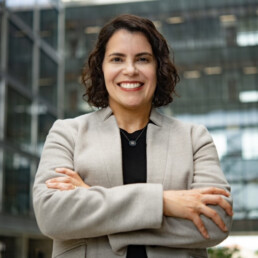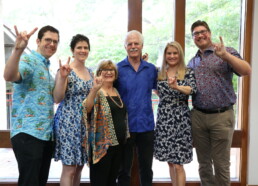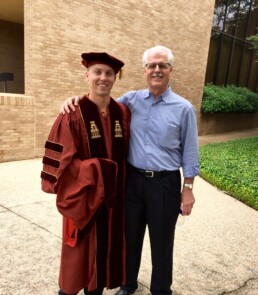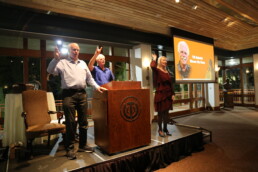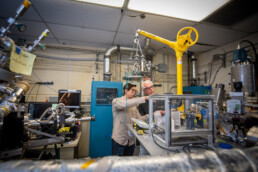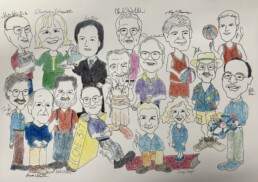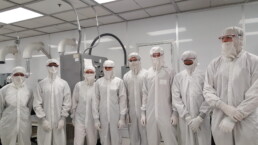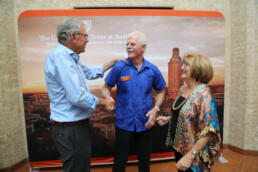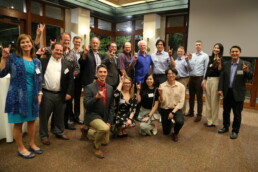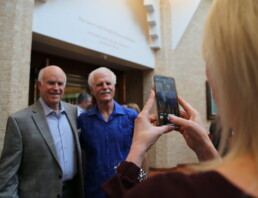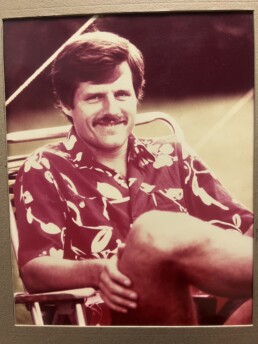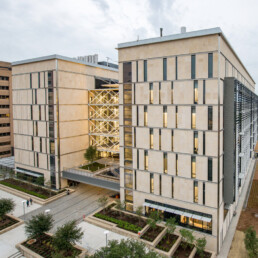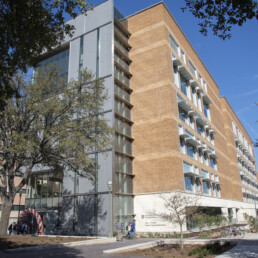by Nat Levy
John Ekerdt thought he was done with Texas. He was 22 years old, fresh off receiving his bachelor’s degree from University of Wisconsin-Madison and on his way to University of California, Berkeley.
He took a summer job in Houston working for Exxon Production Research Company on fracturing emulsions. He loved the work, but like many fellow Texans, he struggled with the heat and the long commute. Oh, and his car didn’t have air conditioning.
The job was great, but the heat and humidity in the summer was just too much,
Ekerdt said. After that experience, I told everyone in grad school I was never going back.
Little did Ekerdt know that he was just a few years away from becoming a decades-long Texas resident, and a Longhorn.
Ekerdt has been with the Cockrell School of Engineering since 1979, when he joined what is now the McKetta Department of Chemical Engineering. He later went on to serve as the chair of the department, and for the last 15 years he has been the Cockrell School’s associate dean for research.
Nearly 45 years later, Ekerdt has officially retired — though he’s still on campus plenty winding down a few big projects. During his time at the Cockrell School, Ekerdt has helped reimagine how Texas Engineers conduct their research and transformed the physical space where innovation, education and research happens.
John’s had such a big impact on our research program, our facilities, which in turn impact recruiting,
said Jerry Speitel, associate dean of academic affairs at the Cockrell School and a close colleague of Ekerdt’s. All the work John’s done over the last 15 years has played an important role in our success as a school.
Early Days
After graduate school, Ekerdt contemplated his next move. He considered two options: academia and corporate research. He sat in an office at UC Berkeley thumbing through a binder of faculty openings.
He made two piles. On the right, the schools he was considering, and on the left were the no’s, essentially Tinder-izing his future. As he was about to swipe left on UT, the scorched memories of his AC-less summer still fresh, a friend sitting with him told him to give the school a serious look.
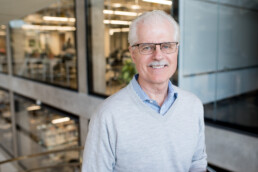
“If it wasn’t for my buddy Bruce telling me to apply at UT, I wouldn’t have considered it, and the rest is history."
— John Ekerdt
When Ekerdt arrived in Austin in 1979, everything was smaller, a lot smaller. The city was more akin to Madison than the booming metropolis it has become in recent years.
Campus was smaller; the buildings were smaller. And the mindset was different, focused more on local and regional matters than the world at large.
In chemical engineering, there wasn’t yet a robust Ph.D. program. The emphasis was more on undergraduate education. Each department acted like its own little family, and the families didn’t interact much.
There’s so much less silo-ing of departments and programs today,
Ekerdt said. We’re a more integrated community now than we were back then.
From Chemicals to Chips
When he started at UT, Ekerdt’s research focused on synthetic fuel. The oil crisis of the early 1970s created an urgency to develop alternatives to oil to produce fuels.
Ekerdt worked on a large U.S. Department of Energy project focused on converting coal into gasoline. He worked on this pathway of fuels and catalysts for several years, but he started to notice a groundswell around microelectronics.
Ekerdt slowly transitioned further into microelectronics over the years with two key focus areas — the surface and material chemistry of growing ultra-thin, metal and metal oxide-based films used in devices and their manufacture and surface chemistry for imprint lithography.
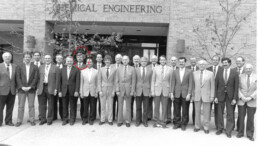
“I knew I had to branch out, because if you just do what you’ve always done you are unlikely to advance. You should always look for ways to re-invent yourself.”
— John Ekerdt
This shift showed Ekerdt’s ability to plan for the future, and adjust when needed, foreshadowing how he would go on to transform research and facilities at the Cockrell School.
The Builder
Wherever Ekerdt went, he landed in leadership roles. It’s no surprise then that he would become chair of his department and later an associate dean. During his time leading the department from 1997 to 2005, he pushed to improve modeling capabilities to enhance the chances of landing large grant projects.
He also sought to increase interdisciplinary research, something that carried through to his time as associate dean. Ekerdt felt that although the department was highly ranked, it wasn’t doing everything necessary to compete with other top chemical engineering departments.
If we aspire to be a top program, top of the field, leaders in the discipline, then we had to do more — we had to do everything,
Ekerdt said. That’s what’s different, we do everything now.
In 2009, he was named associate dean of research by then Cockrell School dean and future UT President Greg Fenves. Having just returned to UT from the University of California, Berkeley, Fenves wanted to transform the research enterprise, and saw Ekerdt as the person to help him do that.
Early on in his tenure, Ekerdt convened a team to develop strategic plans for both facilities and research. These plans helped focus investment in research, faculty hiring and physical space needs.
The facilities plan set the stage for a building boom across the engineering campus. The centerpiece of this new era of the Cockrell School, the Engineering Education and Research Center, opened in 2017, the first new engineering building since 2008.
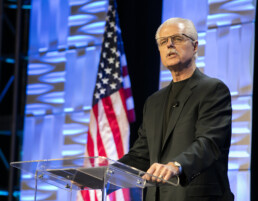
"John was the point person with the architects, the faculty, the central administration. It’s a lot like building a house where you have to make a decision about everything, but in this case, it was 420,000 square feet of decisions with a lot more people to satisfy than a spouse."
— Jerry Speitel, associate dean for academic affairs
That was followed by the Gary L. Thomas Energy Engineering Building, which opened in 2022. And up next, the Engineering Discovery Building, which will eventually house the McKetta Department of Chemical Engineering and the Hildebrand Department of Petroleum and Geosystems Engineering.
It was all part of the plan.
John should earn an honorary degree in civil engineering for leading the transformation in the Cockrell School’s facilities,
said Fernanda Leite, a civil engineering professor herself, and the new associate dean for research.
‘Research Dad’
It wasn’t just buildings; Ekerdt also helped build careers. Brennan Coffey was a part of Ekerdt’s lab for six years, earning a Ph.D. in 2020. He is now a process engineer at Blue Current, a battery technology company.
Coffey chose UT for his graduate work primarily because of Ekerdt; he was the most welcoming person Coffey had ever encountered in academia. He served as a guiding hand for Coffey — who called Ekerdt his research dad
— and many of his fellow students inside the lab and classroom, but also outside it.
Ekerdt encouraged his students to take risks, make mistakes and broaden their skillsets. He empowered them to take on weird
projects and be leaders.
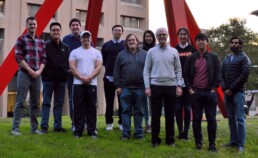
“I’ll always be so appreciative to him for preparing me to be an individual thinker."
— Brennan Coffey, former student of Ekerdt
Like everyone else we spoke to for this story, Coffey had plenty of stories to tell about his time with Ekerdt. And like many of the stories we heard, most were not safe for publication.
However, Coffey did share one story that encapsulates both his faith in the people he works with, and his trademark sense of humor. Ekerdt couldn’t make it to an important graduate student recruiting event that typically drew heavy faculty attendance.
But he and his students didn’t panic. They printed a picture of Ekerdt’s face and put it on top of their research poster, carrying it around the event and talking up Ekerdt to potential recruits.
Even if what we were dealing with was a serious task, John always found a way to make it fun and have a laugh,
Coffey said.
Legacy and Next Steps
Ekerdt made a promise to his wife of 42 years, Carol, that he would retire at age 70 at the latest. His 70th birthday was in May 2022, and the announcement of his retirement came in April 2023 — just under the wire.
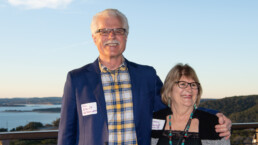
“It was the promise I made, so I knew I darn well better honor it."
— John Ekerdt
Ekerdt says he’s thought about starting a sausage company, and becoming an expert in smoking meats. He would then go on to eat his way through Germany and Italy and Spain.
It’s unclear how seriously the notorious jokester actually considered this idea, but it was enough to make his wife nervous. Added bonus, it stopped people from asking a bunch of follow up questions.
Though he’ll have a lot more free time, Ekerdt won’t disappear from the Cockrell School entirely. He is staying on in a limited capacity to push the Engineering Discovery Building process closer to completion.
Throughout the summer, he worked closely with Leite to ensure a smooth transition. Leite said she plans to continue Ekerdt’s legacy of expanding collaborative research and building out the engineering campus.
Leite is well suited to both tasks. Her background is in construction engineering, where she became a world-renowned expert in building information modeling. And she has been an integral part of Planet Texas 2050, a UT-wide grand challenge that aims to help the state deal with significant population growth, escalating climate issues and their impacts on our urban infrastructure systems.
Leite will continue to push for creating and participating in large, multidisciplinary research centers. And on the facilities side, there are plenty of buildings on campus that need love. And Ekerdt would also like to see a new facility at the J.J. Pickle Research Campus that caters to partnership opportunities by co-locating industry and academia in the same space.
“John’s left this office in a really great place; he’s prepared for this transition well. I look forward to continuing John’s legacy and helping the Cockrell School take the next step forward.”
— Fernanda Leite, associate dean for research
